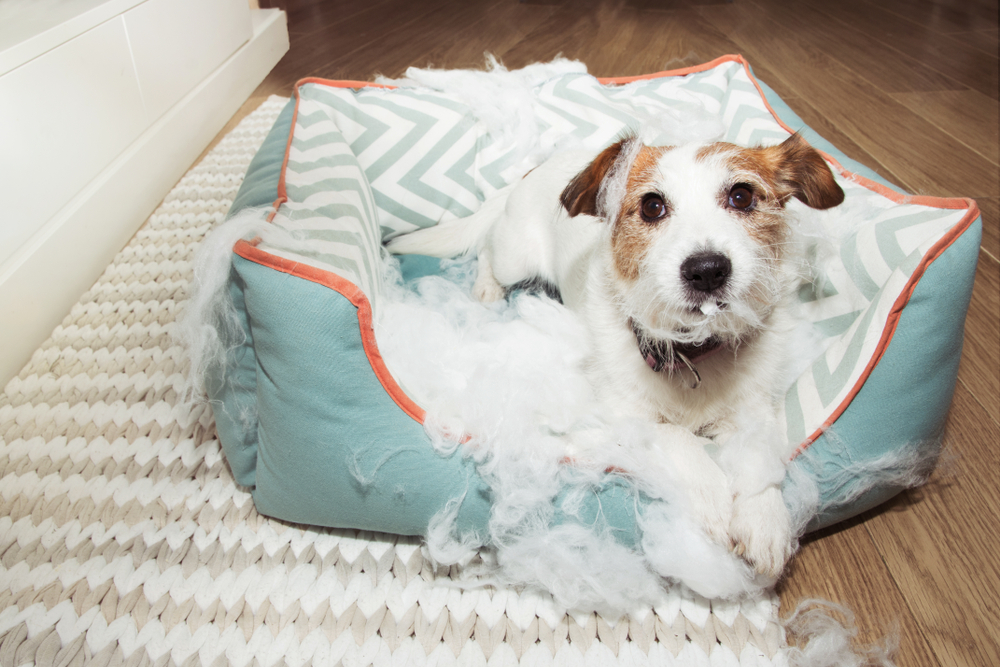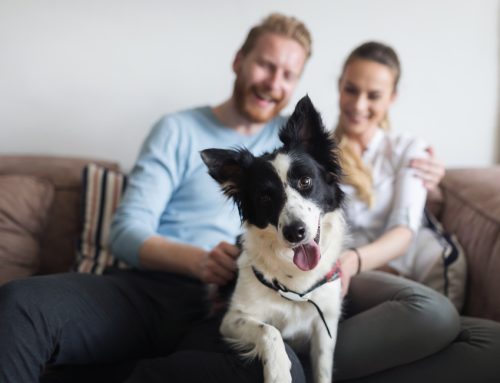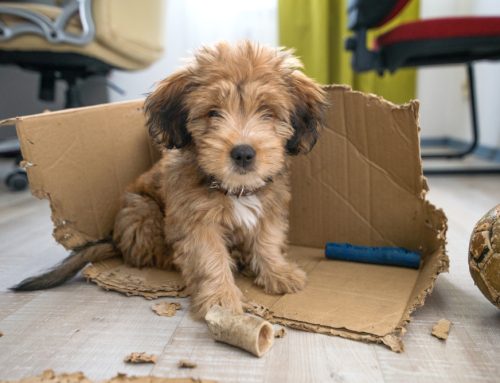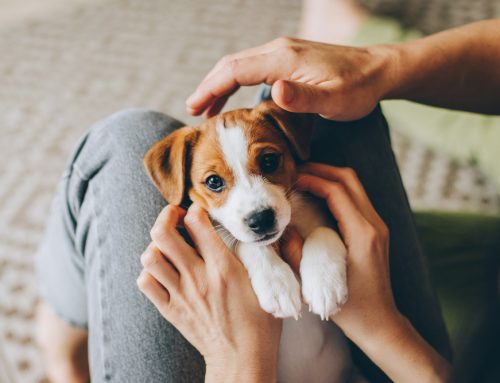Puppies need guidance and boundaries to behave in an acceptable manner, and if you don’t address these needs through training, they likely will not become well-mannered and well-adjusted adult dogs. Our team at WesVet Animal Hospital wants to help by offering remedies to address five common puppy behavioral problems.
Prevent your puppy from chewing destructively
Chewing is normal for all dogs to learn about their environment, and to combat issues like frustration and boredom. Puppies 5 to 9 months old also chew to relieve pain from teething, as their sharp pearly whites cut through their sensitive gums. The key is to ensure your puppy chews on appropriate objects, as opposed to your couch cushions or favorite pair of shoes. Steps to remedy the issue include:
- Remove off-limits objects — Remove any items from your puppy’s vicinity that you don’t want them putting in their mouth. Your puppy is a baby, and they want to chew, so they will chew on anything they can get their teeth on until they are trained to do otherwise.
- Reprimand your puppy only during the act — If you catch your puppy red-handed, chewing on an off-limits object, clap your hands loudly to stop the behavior. Never reprimand them if you discover after the fact that they have chewed on a forbidden item. They won’t be able to connect the punishment with the behavior, which will only cause them stress, and won’t remedy the problem.
- Redirect your puppy’s attention — Once you clap your hands to get your puppy’s attention away from the forbidden object, offer them a toy they are allowed to chew. Ensure you provide several chew toys, so your puppy won’t be enticed to chew on inappropriate objects.
- Choose chew toys wisely — If you don’t want your puppy chewing on your shoes, don’t give them chew toys that resemble shoes. Provide only chew toys that don’t resemble forbidden objects.
Prevent your puppy from nipping
Needle sharp puppy teeth can hurt, and you definitely don’t want them biting down hard when they have their adult teeth. Steps to remedy the issue include:
- Teach bite inhibition — Puppies must be taught to use their mouths gently. This lesson typically begins when they are playing with their littermates, who yelp and stop playing if they are bitten too hard. You can continue this lesson by loudly saying “Ouch” if your puppy bites too hard, and stopping playtime. They will quickly learn that they need to use their mouth softly to play with you.
- Don’t be dramatic — If your puppy bites too hard, don’t shake your injured hand dramatically. Your puppy will likely find this highly entertaining, and they may bite again, to see the show.
- Never hit your puppy — Do not resort to physical punishment to correct your puppy when they bite. This will only ruin your relationship, and may also cause them to bite back.
Prevent your puppy from jumping up
Puppies jump up to get attention, and they will continue to jump on you or others, as long as they are rewarded. Steps to remedy the issue include:
- Turn around — When your puppy jumps on you, turn around, and remain still. If they continue to jump, walk away. Once they remain calm, with all four paws on the ground, you can pet them and give them a treat. This will help them see that jumping up will not be rewarded by attention.
- Tell your friends — Ensure your friends and family members respond appropriately when your puppy jumps, so your puppy isn’t confused by different messages.
Prevent your puppy from barking excessively
Puppies bark to communicate, but excessive barking can be problematic—and make your neighbors extremely unhappy. Steps to remedy the issue include:
- Socialize your puppy — Expose your puppy to as many people, places, noises, smells, and circumstances as possible, so they won’t be alarmed and feel the need to bark when they encounter new situations.
- Train your puppy to stop barking on cue — Choose a command, such as “Quiet” or “Enough,” that you use when training your puppy. Then, when they bark, get their attention with a treat or a toy. Once they stop barking, allow them to have the treat or toy. Repeat this process, waiting for increasingly longer times before giving your puppy the treat or toy. Once your puppy has stayed quiet a few times, incorporate your command word in a firm, audible voice while they are barking, and hold up the toy or treat. Reward your puppy when they stop barking. Practice this lesson frequently.
- Don’t yell at your puppy — Yelling at your puppy will likely only make them bark more, because they think you are barking, too.
Prevent your puppy from begging

Giving your puppy a morsel off your plate may seem an innocent gesture, but this can lead to annoying behavior. Steps to remedy the issue include:
- Stop all handouts — Never give your puppy people food, whether you are at the table or eating a snack on the couch. Any small offering perpetuates the behavior.
- Crate train your puppy — Teach your puppy to enjoy time in their crate during meal times, so they aren’t underfoot.
- Distract your puppy — Feed your puppy using a food puzzle toy during family meal times, so they focus on their own meal.
Taking the appropriate steps to train your puppy will provide the necessary boundaries for them to grow up a well-behaved adult dog. If you have questions about your puppy’s behavior, contact our team at WesVet Animal Hospital. We can help remedy the problem.







Leave A Comment